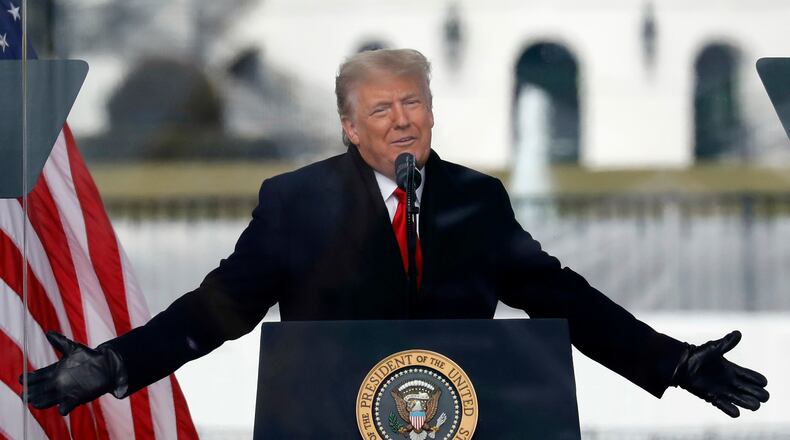Two metro Atlanta counties have won legal fees in an election lawsuit brought by former President Donald Trump.
Election officials in Cobb and DeKalb counties sought the fees in a Trump lawsuit that sought to overturn the presidential election in Georgia. A hearing on those requests was set for this Friday.
But last week the Cobb County Board of Elections received $15,554 to cover its legal costs through June 1, the county’s attorney confirmed. A DeKalb court brief filed late Monday confirmed the “plaintiffs, through counsel, have provided payment for the full amount of attorneys’ fees” the county requested. DeKalb sought $6,105 in fees in a motion filed in February.
“The two motions (for attorneys’ fees) have been withdrawn. There was no settlement agreement,” Trump attorney Randy Evans told The Atlanta Journal-Constitution. “The taxpayers in DeKalb and Cobb have been fully reimbursed. There are no other details because there are no other details.”
Evans denied the former president paid the fees, but he would not say who paid them.
Daniel White, the attorney who represented Cobb County, confirmed the payment came from Evans’ law firm. Evans is representing Trump, his campaign and Georgia Republican Party Chairman David Shafer in the lawsuit. Shafer did not respond to a request for comment.
“I would certainly defer to them if they want to clarify where they got the funds from,” White said.
The payment of attorneys’ fees is the latest fallout from a barrage of failed lawsuits that sought to overturn the presidential election in Georgia and other swing states won by Biden. In some of those lawsuits, the plaintiffs or their attorneys face possible sanctions or disciplinary action. Others face defamation lawsuits for spreading conspiracy theories about the Dominion Voting Systems machines used in Georgia elections.
Trump filed one of his lawsuits in December in Fulton County Superior Court, seeking to challenge Biden’s narrow victory in Georgia. The defendants included Georgia Secretary of State Brad Raffensperger and 15 Georgia counties.
Among other things, the lawsuit said tens of thousands of ineligible voters cast ballots in November, and it included a list of names.
Election experts said Trump’s list of illegal voters was riddled with errors, based on faulty analyses and demonstrated a lack of understanding of election laws. They called his evidence “highly inaccurate,” “wildly unreliable” and “worthless.”
Trump withdrew the lawsuit in January on the eve of a trial — and the day after a mob of his supporters stormed the U.S. Capitol, seeking to prevent Congress from counting the electoral votes.
But Cobb and DeKalb counties, both defendants in the lawsuit, weren’t ready to let it drop. They filed motions seeking attorneys’ fees.
“Given the number of failed lawsuits filed by the former president and his campaign, petitioners apparently believed that they could file their baseless and legally deficient actions with impunity, with no regard for the costs extracted from the taxpayers’ coffers or the consequences to the democratic foundations of our country,” Cobb’s motion said.
“Frivolous lawsuits associated with election administration is nothing new for losing candidates,” Raffensperger said Monday.
He said Democrat Stacey Abrams, who was involved in litigation following the 2018 governor’s race, should also pay the legal fees from those lawsuits.
A key difference between the Trump and Abrams lawsuits: Trump’s went nowhere, while Abrams and her supporters won some of their legal battles. Among other things, they forced election officials to review absentee and provisional ballots that had been initially rejected. Some of those lawsuits are still active.
The payment of the legal costs in Trump’s lawsuit apparently ends the litigation. But numerous election-related lawsuits continue to wind their way through the courts. And some could result in sanctions against the Trump supporters who filed them.
In February a federal judge in Washington D.C. referred the plaintiff’s attorney for disciplinary action for what the judge called “political grandstanding” in the case, which included several Georgia plaintiffs and defendants. The attorney has appealed the judge’s decision.
Elsewhere, plaintiffs face possible sanctions for allegedly making false and misleading claims in a Colorado election lawsuit whose defendants include Raffensperger and Georgia Gov. Brian Kemp. And former Trump attorney Sidney Powell and other lawyers face sanctions in a Michigan election lawsuit for allegedly making false and misleading claims.
Powell and Trump attorney Rudy Giuliani also face defamation lawsuits for spreading conspiracy theories about Dominion Voting Systems.
Though none of the lawsuits succeeded in overturning the election, they helped sow doubt about the outcome of the election and inspired a wave of new voting restrictions in Georgia and other states.
The story so far
In December, then-President Donald Trump filed a lawsuit in Fulton County Superior Court, seeking to overturn the results of the election in Georgia. In January he withdrew the lawsuit.
In February, Cobb and DeKalb counties asked a judge to require Trump to pay attorneys’ fees, calling Trump’s lawsuit “meritless and legally deficient.” On Monday attorneys confirmed the fees have been paid.
About the Author
The Latest
Featured




